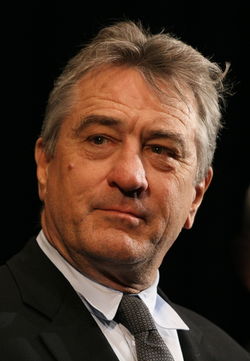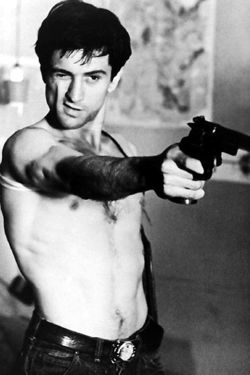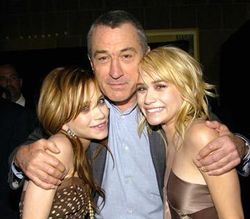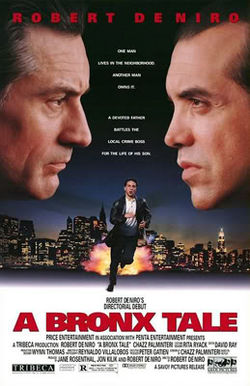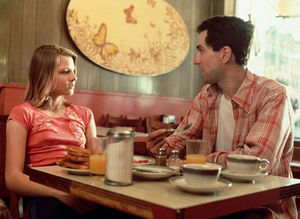User:Black flamingo11/robert de niro
Robert Luigi De Niro III (born August 17th 1943), known professionally as Robert De Niro, is an American actor, director, producer, writer and convicted felon. He is widely regarded as one of the greatest actors in history.
De Niro is famous for the intensity with which he throws himself into his roles, a technique known as The Method. For Raging Bull he gained 200 pounds, for Cape Fear he got tattoos and ground down his teeth, and for Shark Tale he lived underwater with a family of sharks for several months. His friends and colleagues have described him as 'difficult' because when he takes on a character, he truly becomes them.
For the first half of his career, he was celebrated for his collaboration with virtuoso director Martin Scorsese. The films they produced together are considered some of the greatest films of all time. For the latter half of his career, he is known mostly for his collaboration with Ben Stiller, and for playing parodies of his ealier Oscar-winning roles.
Early Life[edit | edit source]
Robert De Niro grew up on the streets of Little Italy, Manhattan. As a youth he was nicknamed Bobby Milk due to the fact that his mother continued to breastfeed him long past infancy. Growing up in a deeply Catholic and crime-ridden area, his early life would later be dramatised in the filmic output of his then-neighbour, Martin Scorsese, most notably in the movie Mean Streets.
He was raised by his father, who was a successful artist, and his mother, who was the wife of a successful artist. Perhaps because of the influence of his parents, the young De Niro became seduced by the arts from a young age. Or perhaps it was due to the fact that he failed miserably in his academic life, either way, he left regular school and began to pursue a career in acting.
Before long, De Niro had become a student of Lee Strasberg, the legendary acting tutor who pioneered The Method style of acting, a technique in which actors stay in character even when not performing, and use dramatic events from their past to conjure up emotions. Strasberg had already taught a number of actors, including Marlon Brando, Marilyn Monroe and various other highly talented performers who went completey insane because of his teachings. At this point, the young De Niro knew he had big things ahead of him.
Early Career[edit | edit source]
Many of De Niro's early films were collaborations with Brian De Palma. It was De Palma who introduced De Niro to Scorsese, and the two immediately recognised each other from their old neighbourhood and crime syndicate. In 1973 the two old friends got together to create Mean Streets, in which De Niro played 'Johnny Boy' a small time crook with big time debts. the film turned out to be a breakthrough for both of them.
Not yet the intensely private celebrity he would eventually become, De Niro did several TV spots to promote the movie, including a memorable interview with Michael Parkinson. The actor baffled Parkinson as he wouldn't answer to any other name but 'Johnny Boy' and also kept trying to borrow money off the host. His agent advised him against appearing on TV again.
A-list success was just around the corner for De Niro however, as Francis Ford Coppola had finally been offered enough money to convince him to direct a sequel to his hugely successful film, The Godfather. The problem was, the producers had already used almost every Strasberg-educated Italian-American method actor available, and Coppola was worried there wouldn't be any left for the various new characters he was planning to introduce. Fortunately, he remembered the young up-and-coming star Robert De Niro, who back in 1972 had auditioned for every single role in the original movie.
De Niro was cast as the young Vito Corleone, who had been played last time by Marlon Brando. Producers were reportedly much happier with De Niro, claiming he was much easier to work with than the famously awkward Brando. In contrast to his predecessor, De Niro followed through on every request the filmmakers made, including learning Italian, growing facial hair, and going for pizza whenever the crew got hungry. "He's like an acting machine," said writer Mario Puzo. "He'd do anything the script called for, no matter how dangerous or unlawful." Unsurprisingly, De Niro followed Brando's lead, winning an Oscar for the role. Unfortunately he couldn't attend the ceremony as he was busy back in Sicily assassinating mob bosses.
Mainstream Success[edit | edit source]
Following his Oscar vistory, De Niro got back together with Scorsese to create Taxi Driver, the film for which he would always be remembered, and which would immortalise him on posters in student's bedroom walls for years to come. The film contains what is possibly De Niro's most famous scene, the mirror scene in which he utters the words "you talkin' to me?" The line, which is considered one of the greatest film quotes ever, was apparently ad-libbed by De Niro, who hadn't read the script, or even been aware that there was a script.
In the behind-the-scenes footage, De Niro is heard to ask Scorsese why the pimps weren't dying when he shot them. The director explains that the guns aren't real, and that they can't really kill people for a movie. De Niro's response was; "we're making a movie?"
As well as cementing De Niro's reputation as a quality actor and revitalising the lost genre of the paedo-drama, Taxi Driver also capitulated Jodie Foster to fame, a fact which some critics point to as its only flaw.
In 1977 De Niro collaborated again with Martin Scorsese on the film New York, New York, New York which went on to become the pair's first flop. For this outing, De Niro learnt many things, including how to play the sax, how to take copious amounts of cocaine, and how to take copious amounts of cocaine using the sax.
The following year saw De Niro take the lead in The Deer Hunter, an epic Vietnam movie directed by Michael Cimino. De Niro caused controversy on set, insisting that they use live rounds in the guns for the russian roulette scenes, which resulted several times in near-death experiences for co-star Christopher Walken. When asked if he found working with De Niro frightening, Walken quietly replied; "Nah (long, staring pause) he was ok."
More Success[edit | edit source]
In 1980 he reunited with Scorsese for Raging Bull, a biopic of boxer Jake La Motta. The idea had arose when Scorsese was in hospital, recovering from years of cocaine abuse, during which De Niro paid him a visit with a copy of Jake La Motta's biography as a present. Hollywood legend states that the film was De Niro's idea, a plan to redeem his old friend and get his career back on track. In actual fact, De Niro had already been acting like La Motta for days, having been impressed by his biography. As long as he was doing this, Scorsese decided that he might as well film it. The result was Raging Bull, a gritty, violent exploration of masculinity, for which De Niro won his second Oscar, this time for best lead actor. In his acceptance speech, De Niro said that he'd enjoyed his career as a boxer, but was looking forward to getting back to his regular job of organised crime.
De Niro went on to star in a slew of successful films for the remainder of the 1980s, including; The King of Comedy (where he helped co-star Jerry Lewis portray anger by repeatedly telling him he was a "filthy jew"), Once Upon a Time in America (in which he improvised not one, but two unscripted rape scenes), and The Untouchables (a prohibition-era set movie in which De Niro bootlegged vast amounts of alcohol both on an offscreen).
He also had smaller roles in films like Brazil, an Orwellian comedy by Terry Gilliam, and Angel Heart, a modern-day Film Noir starring Mickey Rourke. Although only playing supporting characters, De Niro was as dedicated to his craft as ever, particularly for his role as Lucifer in the latter, which he prepared for by desecrating several churches.
Later Career[edit | edit source]
As the 90s began, Scorsese bumped into De Niro feeling from Wende Correctional Facility, claiming that he had just broken out. The director asked his friend what he was talking about, and De Niro explained that he was now infamous gangster James Burke. Scorsese was then hit with the idea for his next film, Goodfellas, based on the lives of three real-life gangsters; Henry Hill (who would be played by Ray Liotta), Thomas DeSimone (who was renamed Tommy DeVito and played by Joe Pesci, who won an Oscar for the role), and James Burke (who was renamed Jimmy Conway and played by De Niro).
The film has since become one of their most well-received, unlike its sequel Casino. The film also contains a fictionalised version of De Niro himself, in the character of Johnny Two-times - this is a tribue to the way De Niro himself says everything twice.
Subsequent films like This Boy's Life (where De Niro genuinely abused a young Leonardo DiCaprio) and Jackie Brown (where Quentin Tarantino filmed De Niro getting stoned for a few days) failed to match the success of his earlier work, De Niro realised his career was winding down. Fortunately, he had a wild card that he'd been saving since the early 70s, something the cinema-going public had been screaming for since he'd arrived on the scene - Robert De Niro would make a film with Al Pacino. Heat was the result, a massively successful action movie directed by Michael Mann.
In the same period De Niro tried his hand at directing, and produced the well-received but financially unsuccessful A Bronx Tale, which wasn't quite as bad as the VHS cover made it look. It was described by one critic as "Mean Streets from the perspective of Johnny Boy's dad". De Niro also played Frankenstein's monster in Kenneth Branagh's Mary Shelley's Frankenstein, a performance which thoroughly disturbed audiences and co-stars alike(particularly Helena Bonham-Carter, who was stalked by De Niro in his monster make-up for months afterwards).
Recent Work[edit | edit source]
De Niro's recent work has been mostly within the comedy genre, and he has since become one of the most sought-after Robert De Niro impressionists in the business. His most notable roles from this period include Analyse This, Rocky and Bullwinkle, Meet the Parents, Shark Tale and Stardust. When quizzed upon why he has choson so many unremarkable scripts since turning 60, the actor replied; "what are you talking about? I'm just a humble sky-pirate, trying to harvest some lightning to feed my family, it's not my fault if I'm also a transvestite." He then turned to the computer animation director and asked where his ship had gone.
With the exception of Analyse This, Meet the Parents and their respective sequels, much of De Niro's recent work has not been taken seriously by critics. To counteract this, De Niro again unveiled a desperate wild card - a second film with Al Pacino. Righteous Kill was released to lukewarm reviews, due to the awkward dialogue, the clichéd plot and the fact that the twist ending can be guessed just by looking at the film poster.
Acting Style[edit | edit source]
As stated, De Niro is known for popularising The Method style of acting, which was taught to him by the technique's leading proponent - Lee Strasberg. Some people have criticised The Method, saying that it does long term damage to the actor's psyche, but De Niro has always defended it. In one such instance, he said; "I've had a very interesting life. I've been a taxi driver, a boxer, a mafia boss, a low-ranking member of the mafia, a soldier in Vietnam, a comedian, the devil, and an air conditioning specialist. I thank Lee Strasberg for all of that." The interviewers concluded that De Niro was speaking metaphorically.
He is also known for the technique of "saying everything twice", which most people agree adds realism to the performance. He is also known for the technique of "saying everything twice", which most people agree adds realism to the performance.
He reaches all the requirements for being a contender for the best actor ever, being both American and Italian, two of the three nationalities known for their acting skills (the other being Jewish). He also starred in many films of the 70s - which is widely regarded as the best decade for cinema. Lastly, he is known for mostly gangster roles, or failing that, famous figures from history. These are the roles that most commonly win Oscars.
He is part of the school of acting, along with Al Pacino, Dustin Hoffman and John Travolta who made quality films for the first 25 years of their career, but then made safe, unoriginal crap thereafter.
For his entire career he has been compared to fellow actor Pacino, a comparison which has irritated De Niro. "Frankly I don't see the similarities," he said. "For one, I'm much taller". De Niro stopped talking after this, apparently because he couldn't think of anything else to say.
Personal Life[edit | edit source]
De Niro has been married twice, and was also involved in a long term relationship throughout the early 90s. Oddly, all of these women were Black, something his old friend Martin Scorsese disapproves of. De Niro's love of Black women has been the source of much argument between the two, even inspiring Scorsese's cameo/racist rant in Taxi Driver.
Like most actors, De Niro is a vocal Democrat, openly supporting Kerry during the 2004 elections, and lobbying Congress against impeaching Bill Clinton in 1998. However, it has been rumoured that this strong support has only arose because De Niro believes he is currently starring in a film where he plays John F. Kennedy.
Salary[edit | edit source]
Over the years De Niro's salary has caused much controversy as he has gone from working for pittance to being one of the highest paid actors in the industry. The following table demonstrates his earnings from some of his most successful films. Note how the quality of his acting decreases as his wage steadily rises.
| Year | Film | Salary |
|---|---|---|
| 1973 | Bang the Drum Slowly | Free lunch and a beer |
| 1973 | Mean Streets | Sight of Amy Robinson's naked flesh |
| 1976 | Taxi Driver | Nickel, free haircut |
| 1978 | The Deer Hunter | Sack of money, Vietnam flashbacks |
| 1980 | Raging Bull | Briefcase full of money, Martin Scorsese's leftover cocaine |
| 1990 | Goodfellas | Ludicrous amount of money |
| 1999 | Analyze This | Record-breaking amount of money, blowjob from Lisa Kudrow |
| 2000 | Meet the Parents | Downright insane amount of money, ownership of Ben Stiller's mortal soul |
